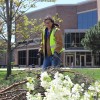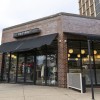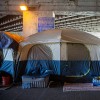

Chicago’s 311 help line, shelter system are struggling to keep up with demand
More people are calling the hotline for shelter as the city faces two converging crises: homelessness and an influx of asylum-seekers.
A surge in calls for shelter requests is overwhelming Chicago’s 311 help line and shelter system. Reset discusses how the hotline works and what resources are needed to better serve unhoused people and asylum seekers.
GUESTS: Anna Savchenko, WBEZ reporter
Amy Qin, WBEZ data reporter
Doug Schenkelberg, executive director of the Chicago Coalition for the Homeless
Mark Mulroe, president of A Safe Haven
LaShunda Brown, chief officer of quality and impact at the Primo Center
Note: We invited the Department of Family and Support Services to participate in this interview but the agency declined. A spokesperson sent the following statement via email:
The Chicago Department of Family and Support Services (DFSS) is currently operating over 4,400 temporary shelter beds for new arrivals in response to increased needs. Additionally, DFSS is making capital investments in the homeless shelter system to sustain current bed capacity, replenish bed capacity to pre-COVID levels or beyond, and transition to more accessible and non-congregate settings. Through the Chicago Recovery Plan, DFSS is investing $40 million in rehab and repair for existing homeless shelters and partnering with the Department of Housing to acquire and rehab new non-congregate facilities with another $30 million.
The best way to create capacity in the shelter system is by supporting households currently experiencing homelessness in moving on to appropriate and stable housing. DFSS has invested $35 million in American Rescue Plan funding and supplemental City investments to house 1,200 households residing in homeless shelters and unsheltered locations in 2023 and continues to support 1,000 households with rental assistance and supportive services. This builds on the success of an initial investment of $35 million in CARES Act funding that supported 1,888 households experiencing homelessness in moving into housing between October 2020 and December 2022.
With federal pandemic-response funding and funding from the Illinois Department of Human Services, DFSS funded additional shelter beds in hotel rooms for people experiencing homelessness from February 2022 to March 2023, particularly in response to increased need during winter months.
More From
Reset with Sasha-Ann Simons


Chicago’s 311 help line, shelter system are struggling to keep up with demand
More people are calling the hotline for shelter as the city faces two converging crises: homelessness and an influx of asylum-seekers.
A surge in calls for shelter requests is overwhelming Chicago’s 311 help line and shelter system. Reset discusses how the hotline works and what resources are needed to better serve unhoused people and asylum seekers.
GUESTS: Anna Savchenko, WBEZ reporter
Amy Qin, WBEZ data reporter
Doug Schenkelberg, executive director of the Chicago Coalition for the Homeless
Mark Mulroe, president of A Safe Haven
LaShunda Brown, chief officer of quality and impact at the Primo Center
Note: We invited the Department of Family and Support Services to participate in this interview but the agency declined. A spokesperson sent the following statement via email:
The Chicago Department of Family and Support Services (DFSS) is currently operating over 4,400 temporary shelter beds for new arrivals in response to increased needs. Additionally, DFSS is making capital investments in the homeless shelter system to sustain current bed capacity, replenish bed capacity to pre-COVID levels or beyond, and transition to more accessible and non-congregate settings. Through the Chicago Recovery Plan, DFSS is investing $40 million in rehab and repair for existing homeless shelters and partnering with the Department of Housing to acquire and rehab new non-congregate facilities with another $30 million.
The best way to create capacity in the shelter system is by supporting households currently experiencing homelessness in moving on to appropriate and stable housing. DFSS has invested $35 million in American Rescue Plan funding and supplemental City investments to house 1,200 households residing in homeless shelters and unsheltered locations in 2023 and continues to support 1,000 households with rental assistance and supportive services. This builds on the success of an initial investment of $35 million in CARES Act funding that supported 1,888 households experiencing homelessness in moving into housing between October 2020 and December 2022.
With federal pandemic-response funding and funding from the Illinois Department of Human Services, DFSS funded additional shelter beds in hotel rooms for people experiencing homelessness from February 2022 to March 2023, particularly in response to increased need during winter months.










